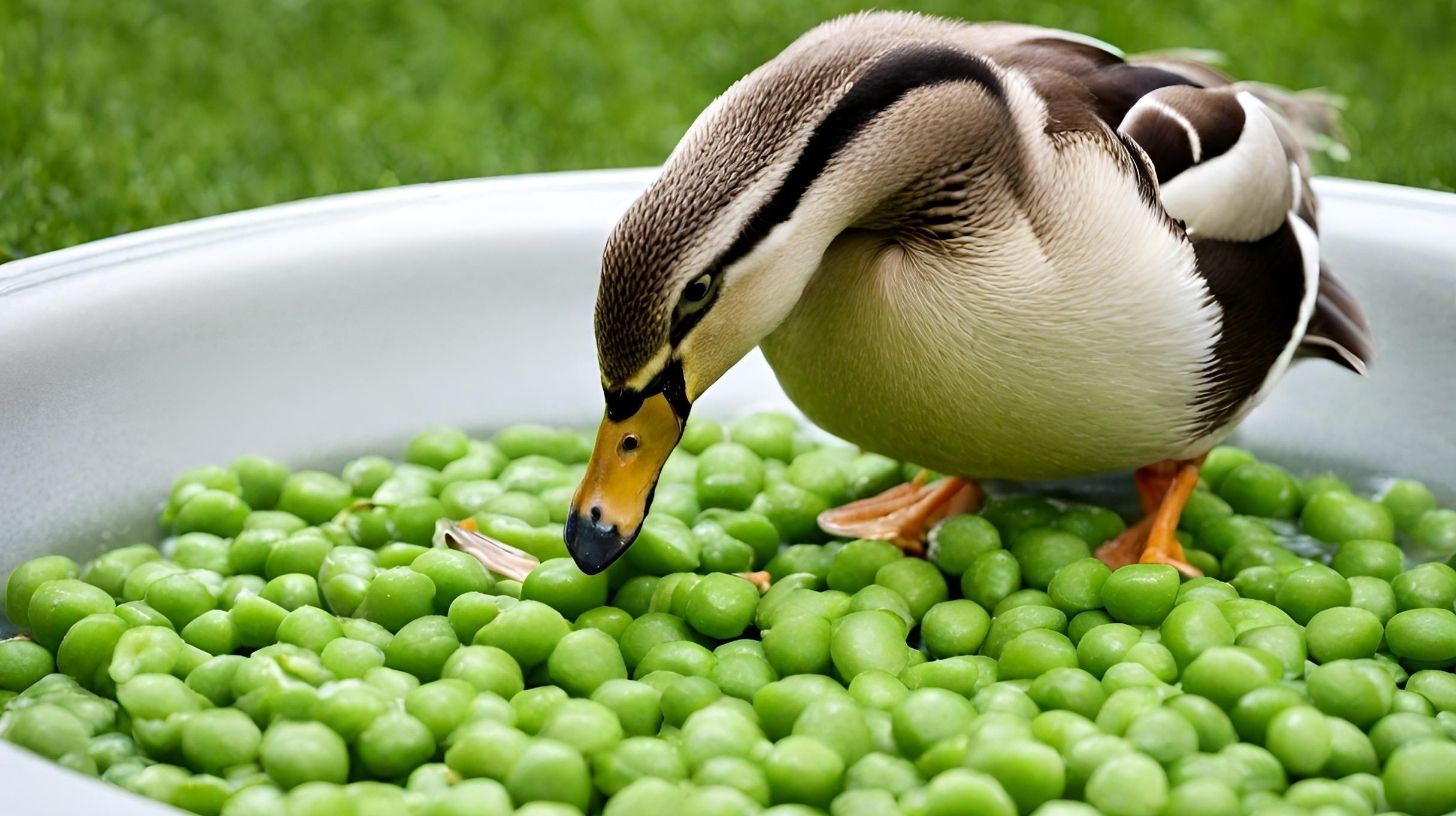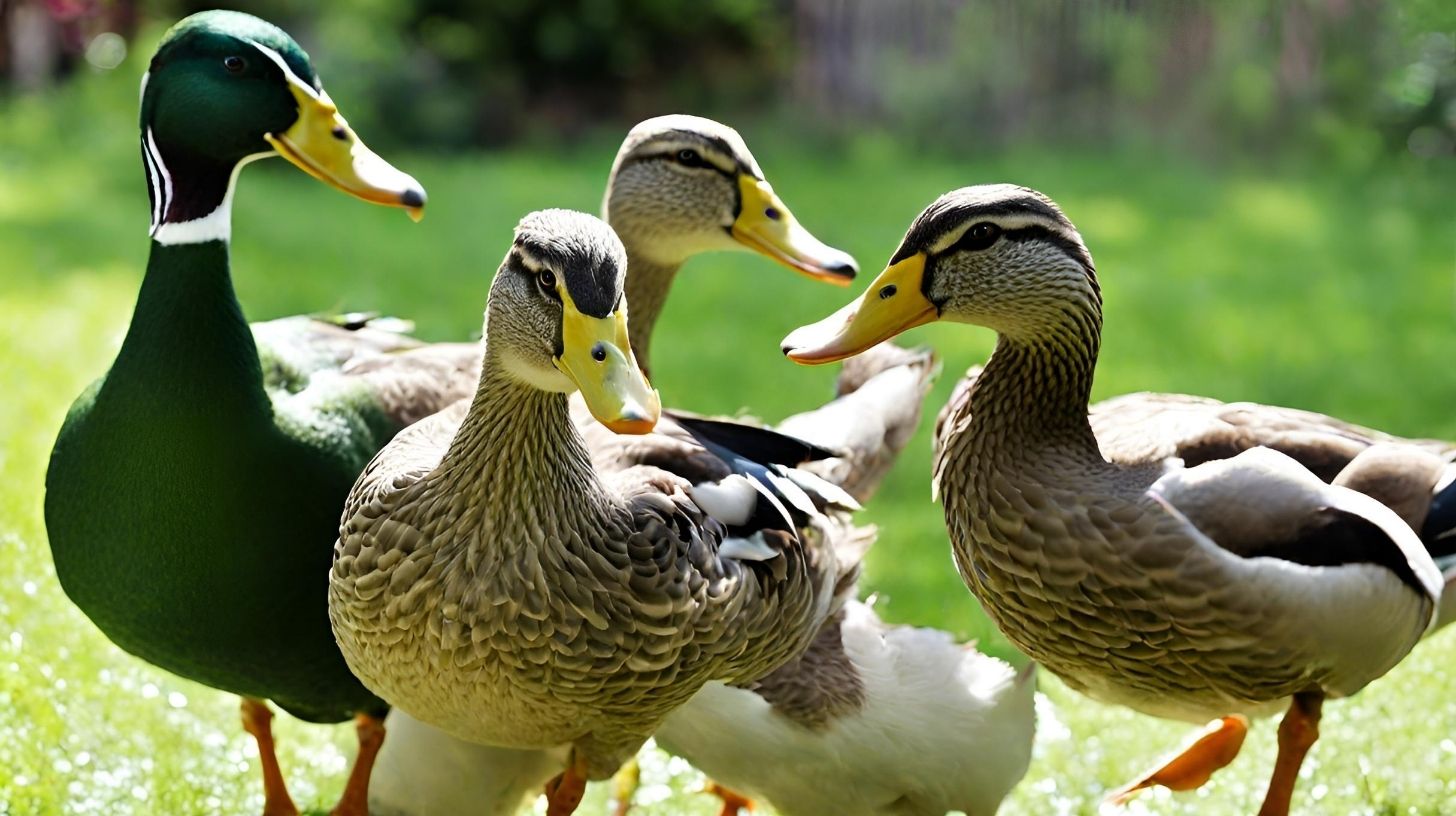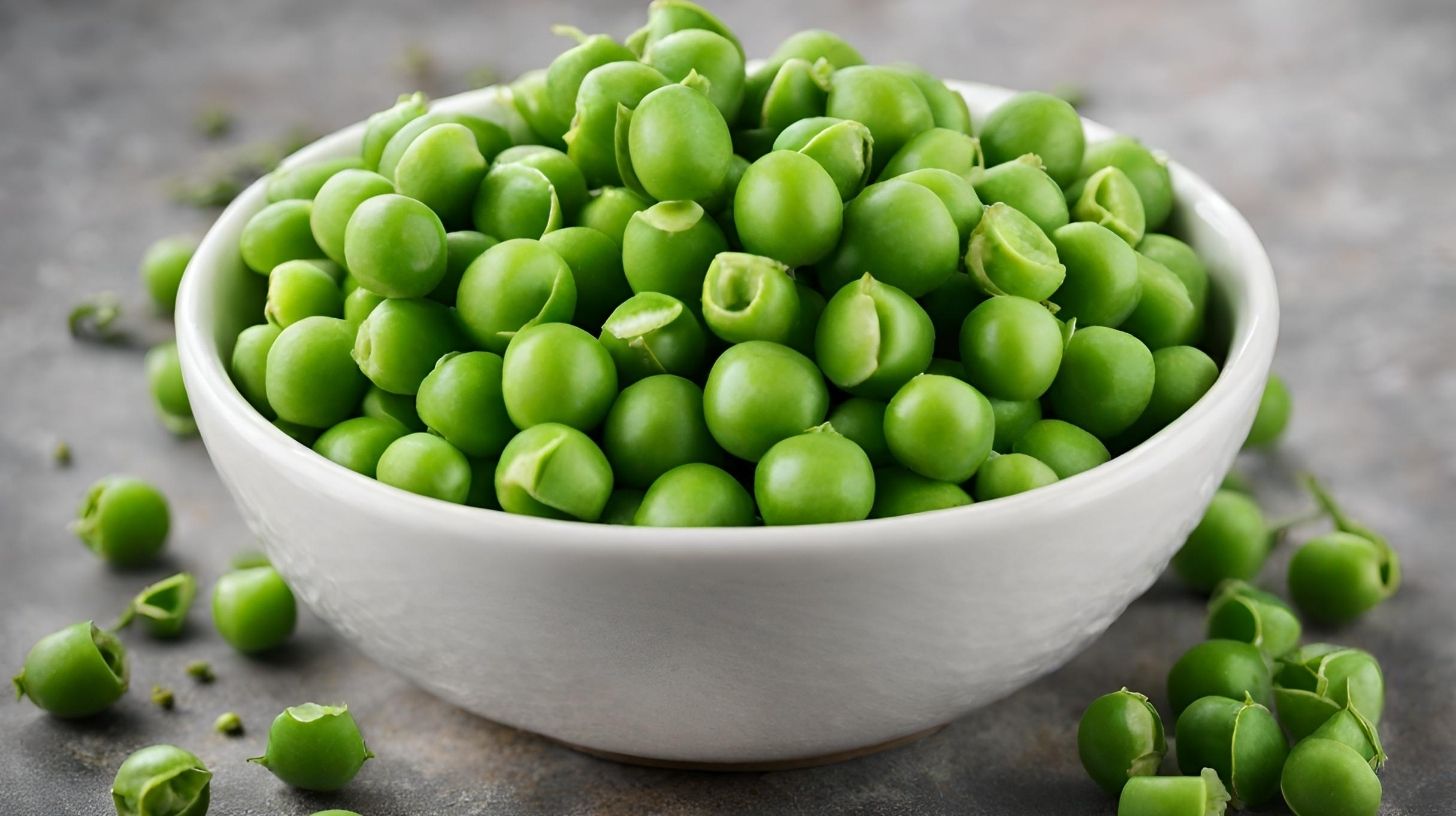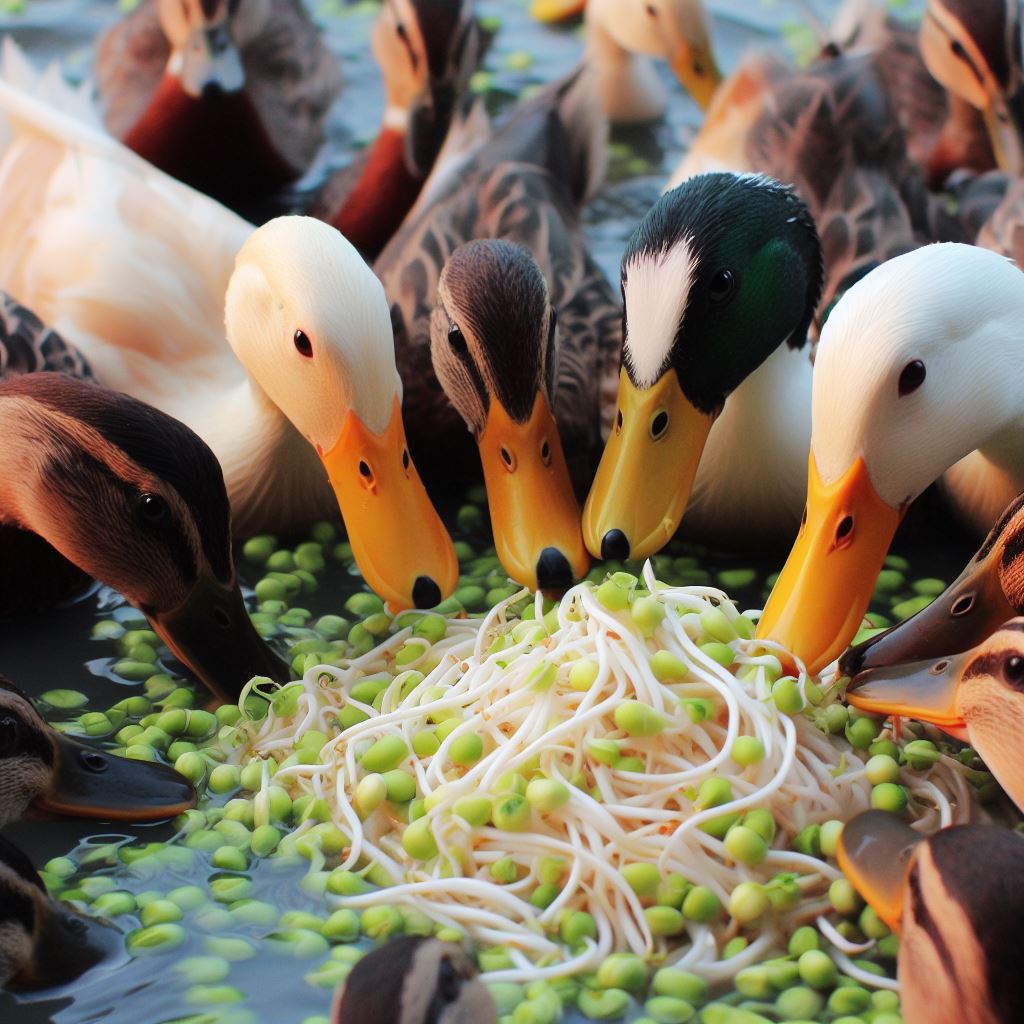Can Ducks Eat Peas? Nutrition and Feeding Tips

Table of content:
Peas are safe for ducks to eat and appeal to their natural foraging behaviors. But too many peas can lead to weight gain and malnutrition if not balanced with adequate greens, proteins and other duck foods. Consider peas an occasional snack, not a dietary staple.
Key Takeaways:
- Peas offer protein and key nutrients for ducks like vitamin C and manganese.
- Peas should be an occasional treat, not a main food source for ducks.
- Chopped, thawed frozen peas are an easy way to feed peas to ducks.
- Feed peas along with greens, seeds, and proteins as part of a balanced diet.
- Avoid peas with added salt, flavorings, or other seasonings.
 Are Peas Good for Ducks?
Are Peas Good for Ducks?
Peas contain beneficial nutrients for ducks when given properly. As a legume, peas provide:
- Protein for growth and development
- Vitamin C for immune health
- Thiamine (B1) for metabolism
- Niacin (B3) for digestion
- Folate for new cell production
- Manganese for bone development
- Phosphorus for nutrient absorption
In nature, ducks forage for seeds and vegetation. Peas appeal to their natural behaviors. The texture and taste of peas entice ducks to eat this nutritious treat.
However, peas lack calcium and should not be a staple food. Ducks require calcium for eggshell development and bone health. Offer peas along with greens, seeds, proteins and grit as part of a balanced diet.
How Many Peas Can Ducks Eat?
Ducks can eat peas daily, but moderation is key. Peas are high in phosphorus and low in calcium. An excess of peas can lead to health issues over time.
Peas should make up no more than 10-15% of a duck’s daily diet. Feed 1-2 tablespoons of peas per duck per day. Adjust amounts based on the size and number of ducks.
Watch duck’s weight and droppings. Decrease peas if ducks become overweight or have loose droppings. Increase variety of greens if peas cause soft eggshells.
Feed peas as an occasional treat, not a main course. Offer peas a few times a week rather than daily.
What Vegetables Can Ducks Eat?
In addition to peas, ducks enjoy many other vegetables:
| Vegetables for Ducks | Nutritional Benefits |
|---|---|
| Chopped Kale | Calcium for eggshells and bones |
| Chopped Lettuce | Vitamin A for immunity |
| Finely Chopped Carrots | Vitamin A for eyesight |
| Thawed Frozen Corn | Carbs for energy |
| Thawed Frozen Green Beans | Vitamin K for blood clotting |
Focus on dark leafy greens like kale, spinach and lettuce. Cooked sweet potatoes, squash and pumpkin are also great choices. Offer a variety of textures and colors.
Chop vegetables into small, bite-size pieces. Avoid large chunks that could choke ducks.
Rinse fresh vegetables to remove dirt and debris. For frozen veggies, thaw completely before feeding to avoid chill.
Vegetables to Avoid for Ducks
Some vegetables are difficult for ducks to digest:
- Whole peas or beans – Can cause choking hazard
- Raw potatoes – Contain solanine toxin
- Dried beans or lentils – Hard to break down
- Onions/garlic – Can cause anemia in birds
Do not feed ducks vegetables with added salt, butter or flavorings. Avoid canned and fried vegetables.
Can I Feed My Ducks Peas?
Yes, garden peas are a nutritious treat for ducks. Choose plain frozen or fresh peas without additives.
For easiest feeding, use thawed frozen peas:
- Thaw frozen peas completely under cool water or overnight in the refrigerator.
- Drain any excess water before feeding thawed peas to ducks.
- Chop partially thawed peas into smaller pieces if very large.
You can also offer fresh peas right from the garden. Remove the outer shell before feeding the tender inside fresh pea to ducks.
Sprinkle a handful of peas into shallow water for ducks to forage. Or place peas in a separate treat dish away from main food and grit.
Observe ducks as they eat to ensure peas are swallowed properly. Adjust piece sizes if ducks have trouble breaking them down.
 Should You Feed Ducks Peas?
Should You Feed Ducks Peas?
Peas can be fed to ducks in moderation as part of a balanced diet. Here are some benefits of peas for ducks:
- Nutritious – Peas offer protein, vitamins and minerals wild ducks seek naturally.
- Foraging – Peas appeal to ducks’ natural foraging behaviors.
- Fun Treat – Ducks relish the flavor and texture of sweet, fresh peas.
- Convenient – Frozen peas are easy to thaw and feed anytime.
However, too many peas could lead to issues like obesity, poor muscle tone, loose droppings and soft eggshells. Peas lack needed calcium for duck health.
For a balanced diet, feed peas alongside:
- Greens such as kale, spinach and lettuce for calcium.
- Proteins like mealworms, crickets or duck feed for full nutrition.
- Grit to help digest foods.
- Clean water – Ducks require fresh, clean water at all times to stay healthy.
Peas should enhance a duck’s diet, not replace key foods ducks need. Feed peas in moderation 2-3 times per week at most.
What Do Wild Ducks Eat?
Wild ducks eat a diverse diet of:
- Seeds – Wild millet, wheat, rye and rice seeds
- Aquatic Plants – Algae, seaweed and pond grasses
- Insects – Dragonflies, mosquitos, flies and beetles
- Crustaceans – Snails, shrimp, crawfish and mollusks
- Frogs – Tadpoles and small aquatic frogs
- Fish – Small fish and fish eggs
- Grains – Corn, soybeans, oats and barley
Wild ducks have varied diets depending on habitat. Pond ducks eat more aquatic plants and animals. Field ducks eat more land insects, grains and seeds.
Their diverse diet provides a balance of:
- Protein for growth from insects and fish
- Carbs for energy from grains and plants
- Calcium for eggshells from mollusks
- Iron for blood from insects
- Fat for warmth from fish and seeds
Domestic ducks have similar nutritional needs. Offer yard ducks a diverse diet to mimic wild foods.
Best Foods to Feed Ducks
While peas make a nice supplemental treat, ducks need a balanced diet of:
Natural Forage
- Chopped greens – Kale, lettuce, watercress
- Fresh grasses – Bermuda, fescue, ryegrass
- Aquatic plants – Duckweed, azolla, hornwort
Proteins
- Mealworms – Live or dried
- Earthworms – Chopped up
- Crickets – Legs removed
- Soldier fly larvae
- Small fish like minnows
Duck Feed
- Duck starter feed for ducklings
- Duck grower ration for juveniles
- Duck maintenance ration for adults
Grit
- Crushed oyster shell
- Crushed granite grit
Let ducks graze freely on grasses and aquatic plants if space allows. Offer protein-rich bugs and commercial duck feed daily. Provide grit in a separate dish.
Safe Foods for Ducks
Here are some other healthy treat options for ducks:
Fruits: Chopped melons, berries, citrus wedges, grapes, bananas
Vegetables: Chopped greens, corn, peas, squash
Meats/Eggs: Finely chopped boiled egg, cooked chicken
Grains: Cooked rice, barley, wheat berries, oats
Seeds/Nuts: Chopped sunflower seeds, chopped peanuts
Introduce new treats slowly. Observe duck droppings and watch for signs of diarrhea. Adjust foods as needed for your duck flock.
Provide a shallow water dish for ducks to rinse sticky foods. Change water 2-3 times a day.
Feeding Ducks Bread – Good or Bad?
Bread offers little nutrition for ducks. White bread is low in essential vitamins and minerals ducks need. It also lacks protein for development.
While not toxic, bread can cause:
- Malnutrition – From eating bread instead of nutritious foods
- Angel wing – A wing deformity from fast growth
- Weight gain – From excess carbohydrates
Moldy bread can make ducks very sick. Feeding large amounts of bread may lead to poor health over time.
Avoid feeding bread to ducks. Choose healthy foods like chopped greens, vegetables, and duck feed instead. Save bread as an occasional treat in small amounts if desired.
If you want to feed ducks at the park, bring chopped lettuce, bird seed, frozen peas, or duck feed. Don’t encourage ducks to gather for bread – it offers minimal nutrition. Promote their natural foraging behaviors with healthy foods instead.
Frequently Asked Questions
How much peas should I feed my ducks?
Feed 1-2 tablespoons of peas per duck, 2-3 times per week at most. Adjust amounts based on duck size and number of ducks in your flock.
Can ducks eat peas every day?
Peas daily can lead to nutritional issues over time. Feed peas just 2-3 times per week as a snack alongside their main diet.
Do peas help a duck’s egg production?
Peas provide protein needed for egg production. But lack of calcium from too many peas can cause thin, soft eggshells. Balance peas with calcium-rich greens.
Are pea shoots safe for ducks?
Yes. Fresh pea shoots provide ducks with vitamin C and other nutrients. Chop pea shoots into small pieces before feeding to ducks.
Can ducks eat snap peas?
Snap peas are safe for ducks. Remove the stringy spine from snap peas before feeding. Chop the inner pea into bite-size pieces.
What about snow peas and sugar snap peas?
Snow peas and sugar snap peas are very similar to garden peas. You can offer them on occasion after removing strings and chopping into small bites.
Conclusion
Peas make a nutritious occasional treat when fed to ducks in moderation. Their sweet flavor and crunchy texture appeal to ducks’ natural behaviors. Yet peas lack key calcium ducks need for bone and egg health.
Feed peas alongside greens, proteins, seeds, and grit for a balanced diet. Chop peas into bite-size pieces and limit to 2 tablespoons per duck, 2-3 times per week at most.
Observe ducks as they eat peas and adjust amounts as needed. Discontinue peas if they cause loose droppings or other adverse effects. A diverse diet will help ensure ducks get all the nutrients they require for good health.
Welcome. I’m Adreena Shanum, the proud owner of this website, and I am incredibly passionate about animals, especially poultry. I founded adreenapets.com as a labor of love, stemming from my desire to share my knowledge and experiences with poultry enthusiasts worldwide.




